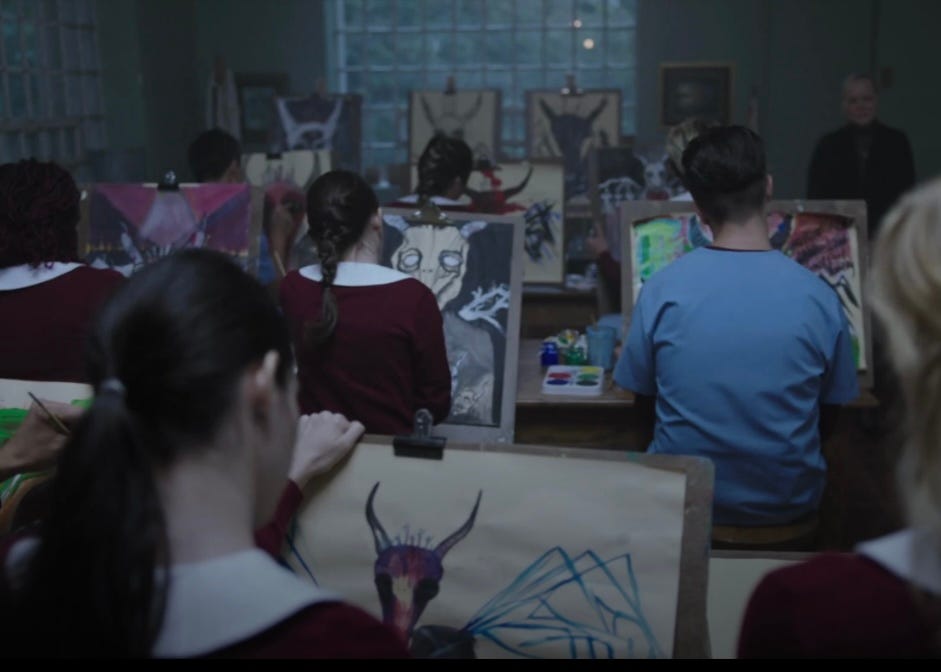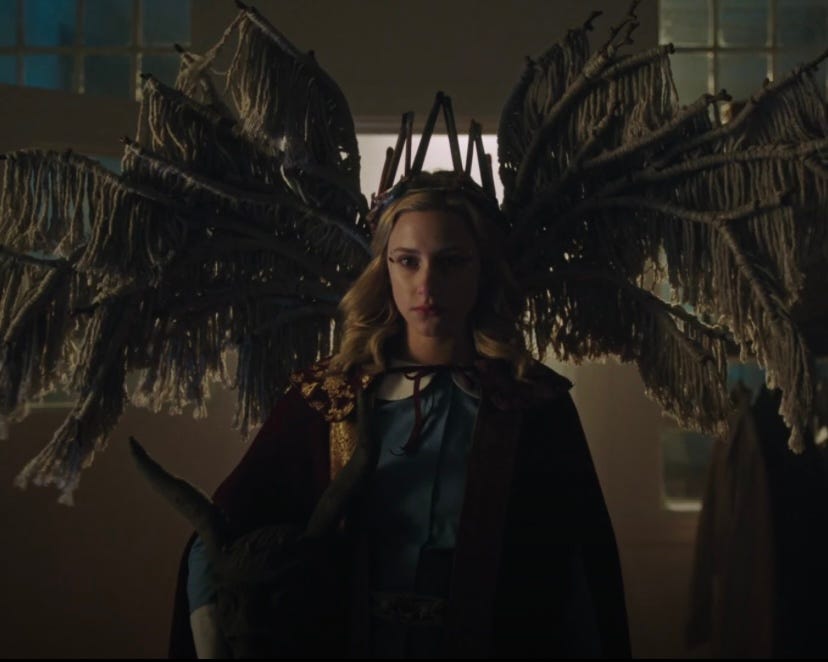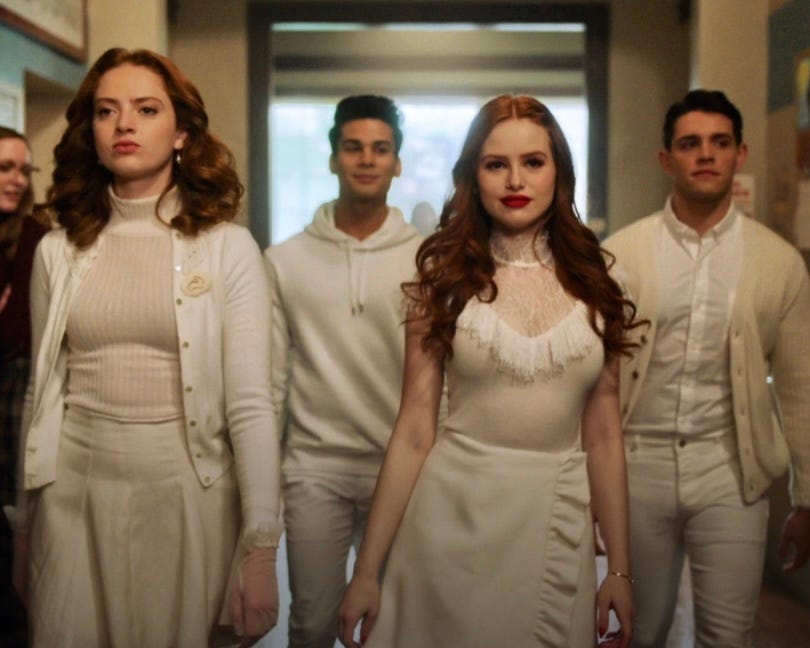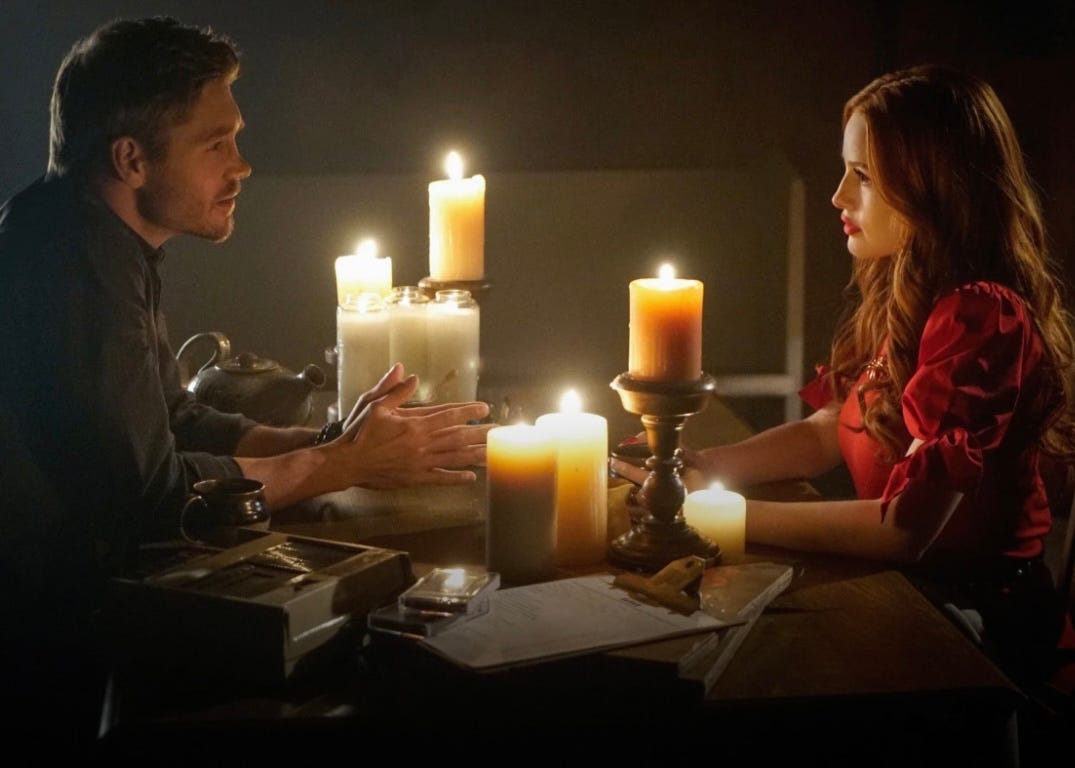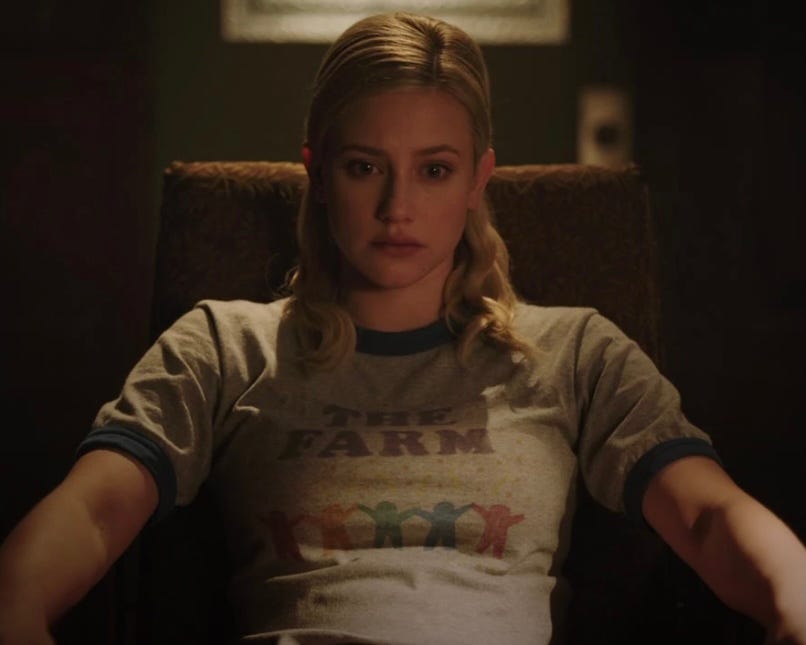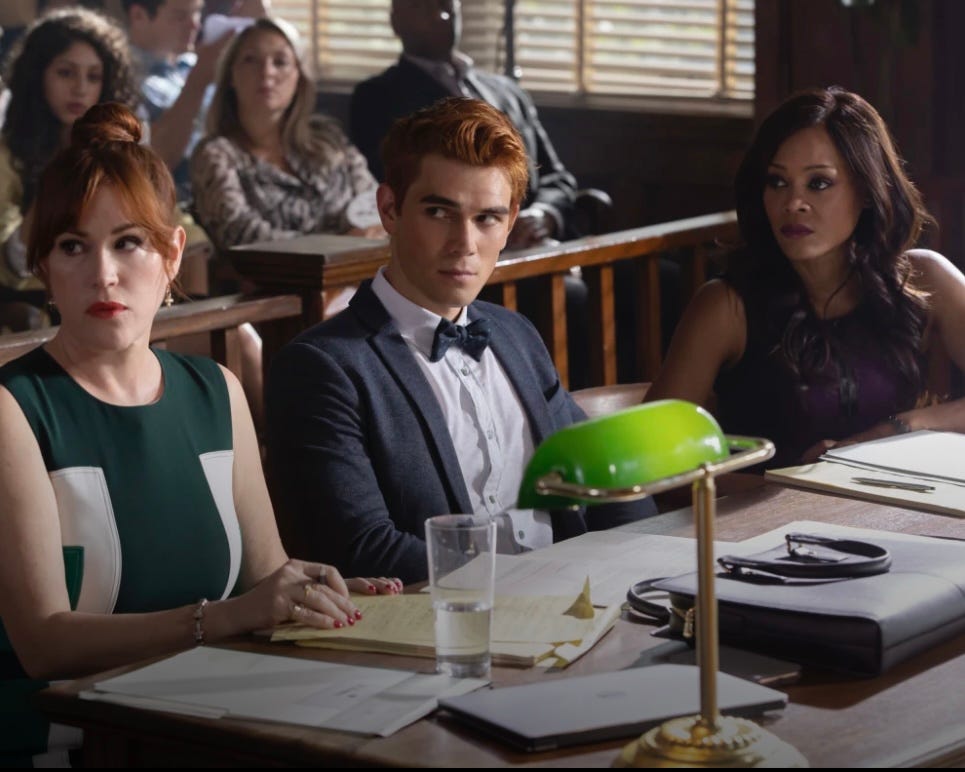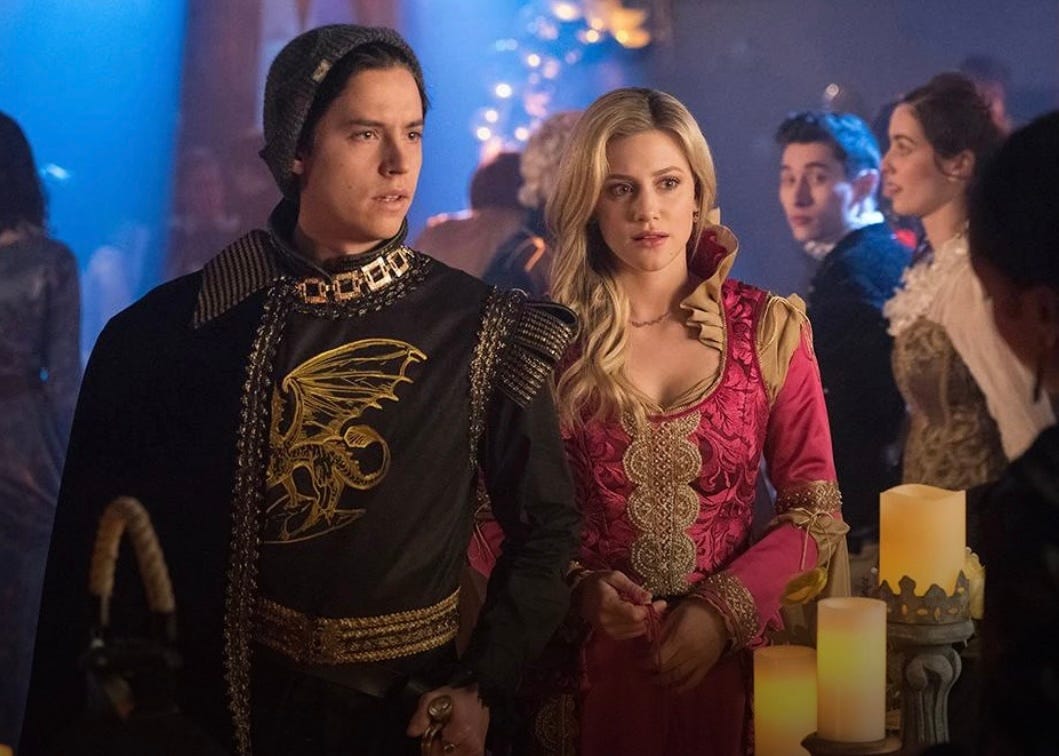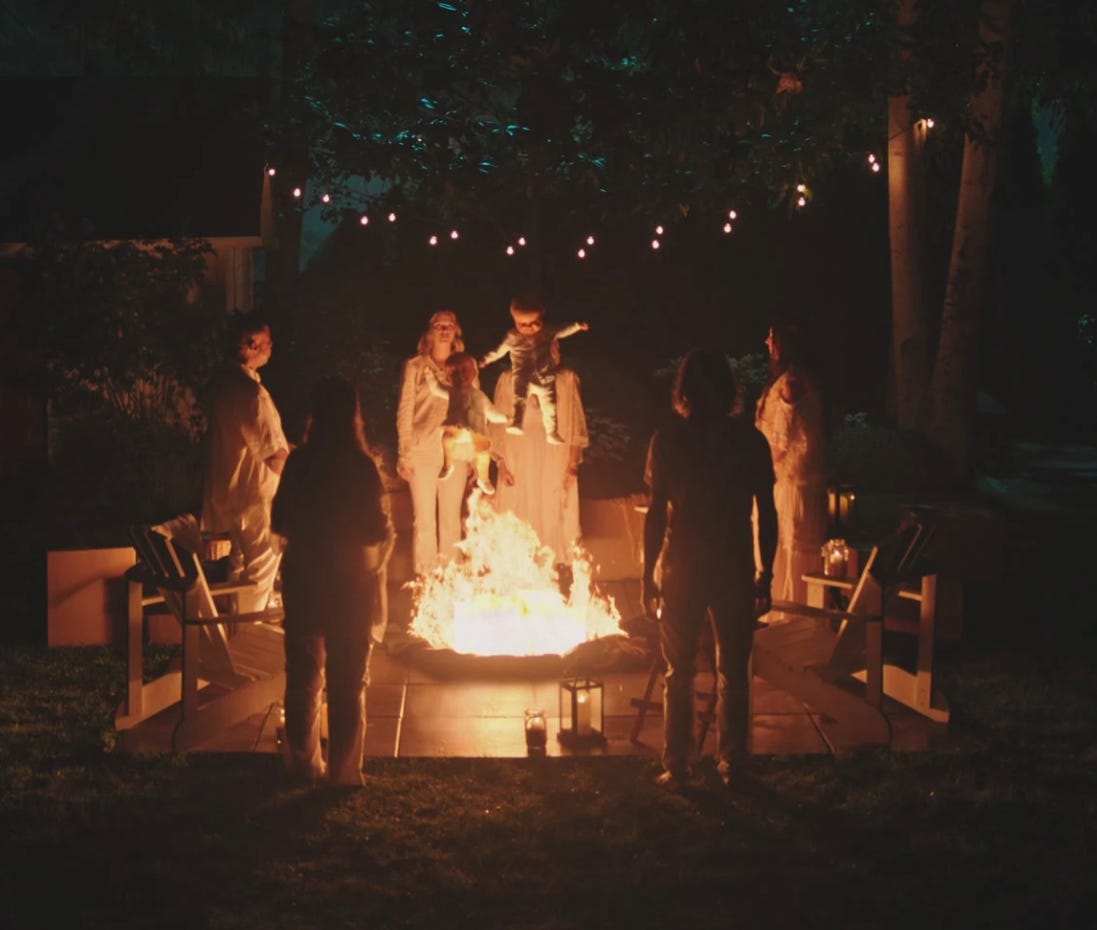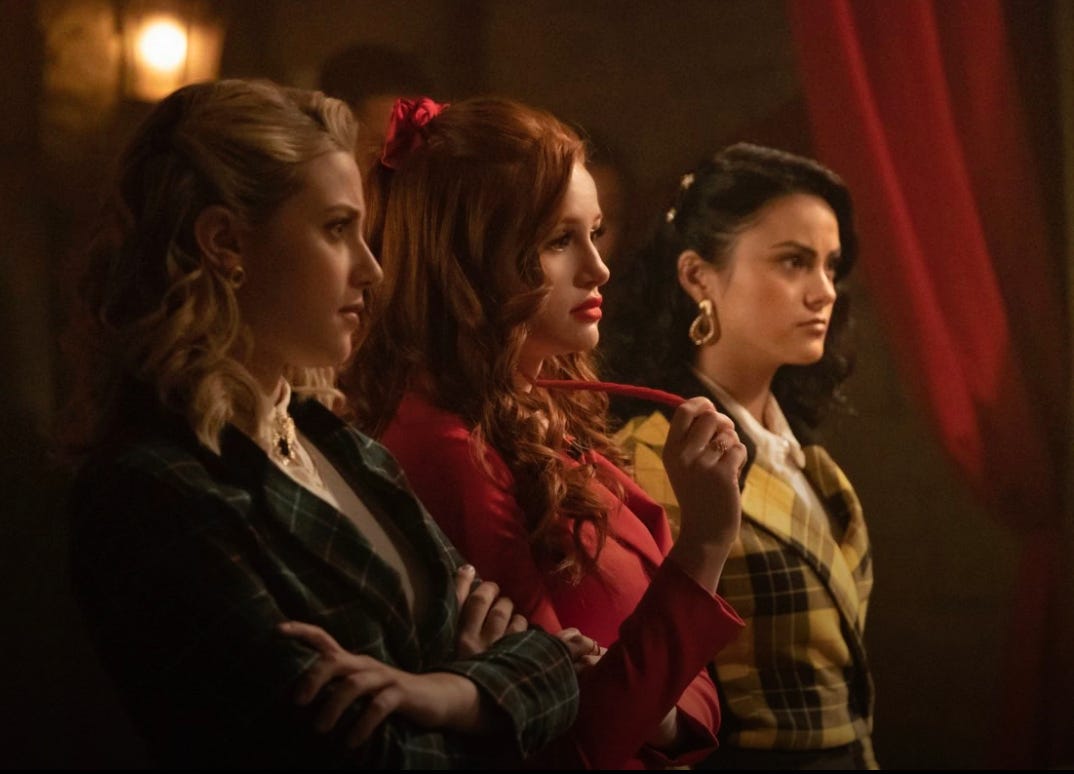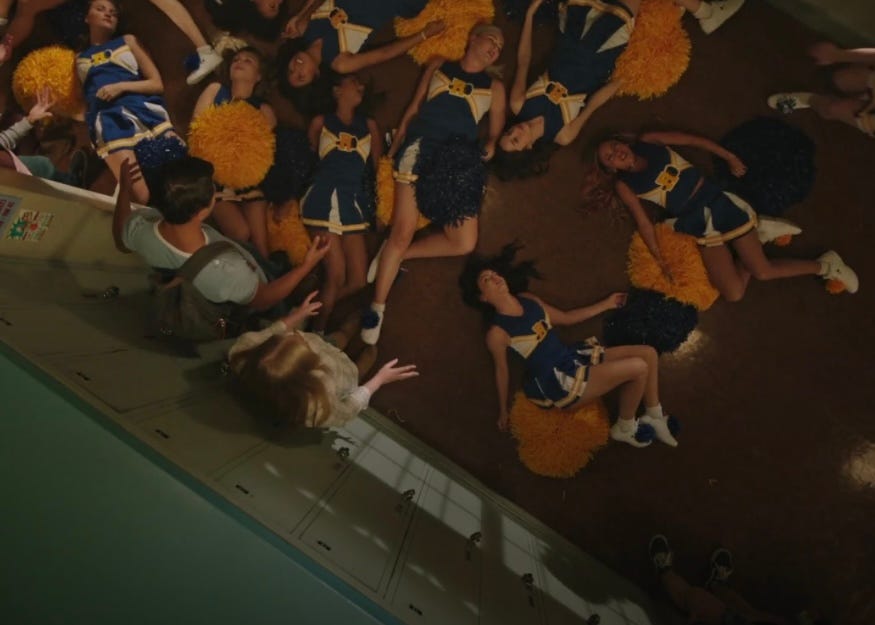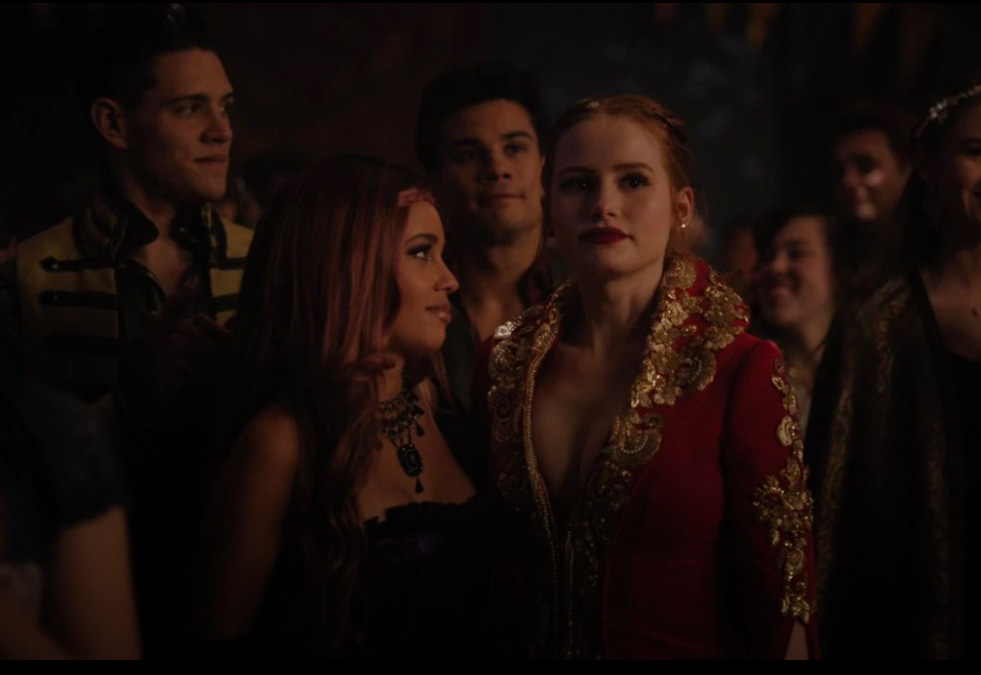“Riverdale is a hideous and cruel place, twisted and cursed.”
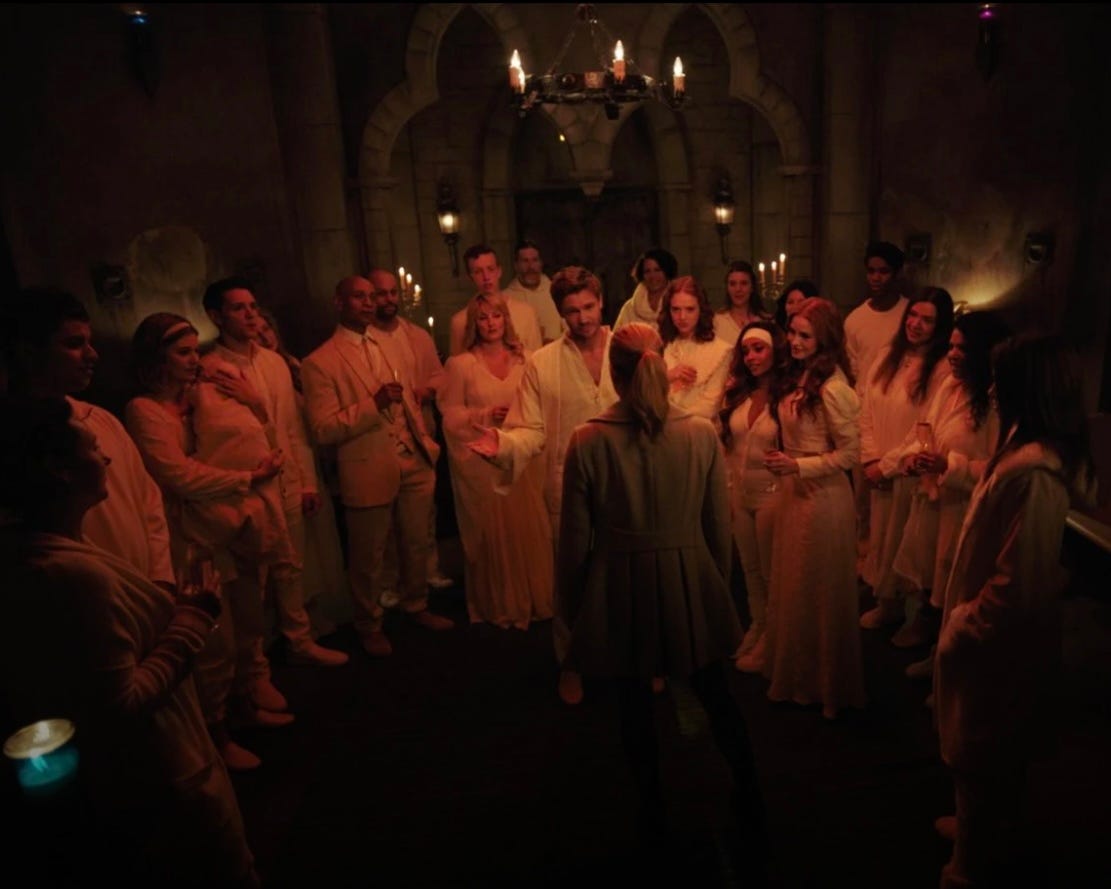
Last week, I shared an in-depth recap of the convoluted, cultish plot line of Riverdale season 3, as well as notes on a few of its most memorable episodes. This week, we’re talking more about cults (and specifically my frustration with the sensationalised, flattened understanding of real world religious groups that we get when we talk about ‘cults’), as well as highlighting some of this season’s most iconic Riverdale moments, and finally, thinking about how these episodes forecast what is yet to come on the show. Before we get into it, a quick summary of this season: A group known as The Farm comes to Riverdale, which tries to take over the town and is eventually revealed to be a dangerous, manipulative, organ harvesting operation. A fantasy role playing game called Gryphons & Gargoyles once played by the parents of Betty, Archie, Jughead, Veronica, and their friends comes back to Riverdale with deadly consequences, and is ring led by former high school game master Penelope Blossom, and the Gargoyle King, Chic. Veronica opens a speakeasy called La Bonne Nuit in the basement of Pop’s, while Archie, after surviving being framed for murder, being forced to fight in an underground prison fight club, and nearly being mauled by a bear, starts running a boxing gym called the El Royale in the Southside. Experimental drugs are spread across Riverdale, and the town’s water supply is poisoned, causing many including the entire River Vixens cheerleading squad, to have seizures and hallucination, and the town is temporarily quarantined. By the end of the season, The Farm has gone missing, a lot of people are murdered as part of the G&G conspiracy and/or at the hands of the Red Dahlia(Penelope Blossom), and our heroes are preparing to start their senior year of high school.
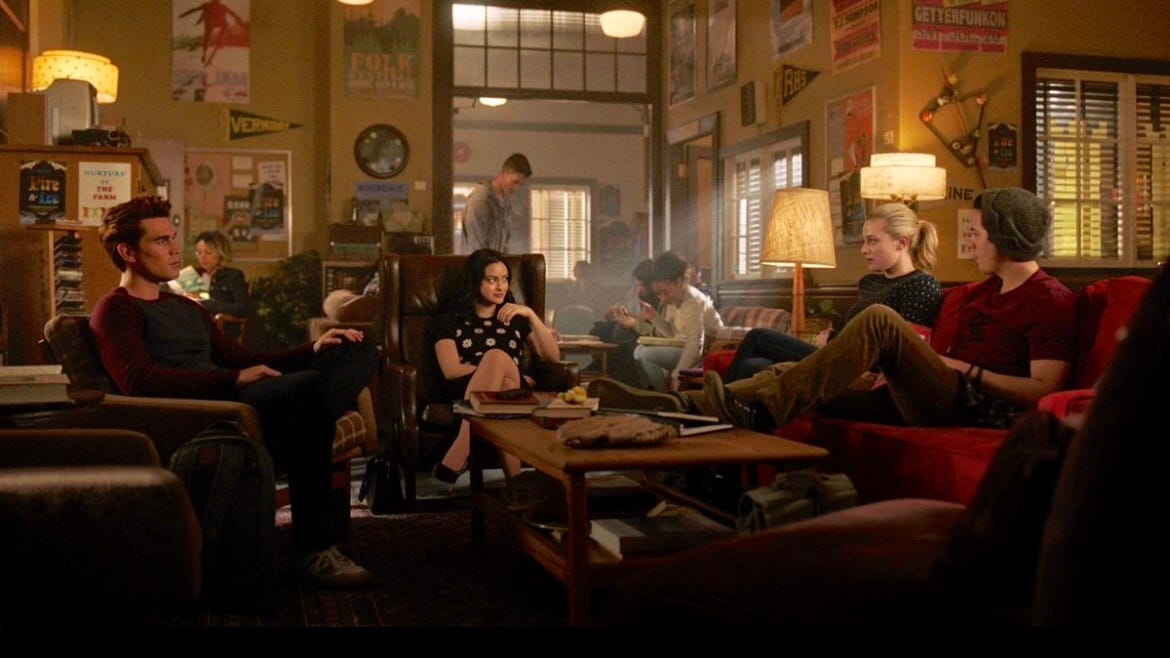
Reflections
Through this season, Riverdale is fully embracing the reference filled, campy writing style that it has developed in its run to this point, making this season a thoroughly entertaining watch. It balances incredibly dark and violent stories of murder, religious control, carceral injustice, etc. with an absurd comedic sensibility, a wide range of musical numbers and performances, and an investment in homage, genre exploration, and the aesthetics of its own storytelling. All together, it makes for a bizarre and incredibly fascinating work.
One element that stood out to me throughout is how the season plays with iconography! The combined aesthetics of tabletop roleplay and high fantasy costuming that come with playing Gryphons & Gargoyles are very fun, and in particular, the imagery of the Gargoyle King - a supernaturally tall, bloody skull with menacing antlers, draped in black robes - is incredibly creepy and memorable. The ritualistic, horrifying murders associated with the King are unsettling and call to mind imagery of folk horror and cult classic horror movies, while the telltale blue lips of many victims are a unique and disturbing image. Action scenes throughout the season - from football games to fights - are made really compelling through the overly stylised depictions of conflict that come paired with musical performances, resulting in sensational and ridiculous sequences which blend athleticism, artistry, and violence.
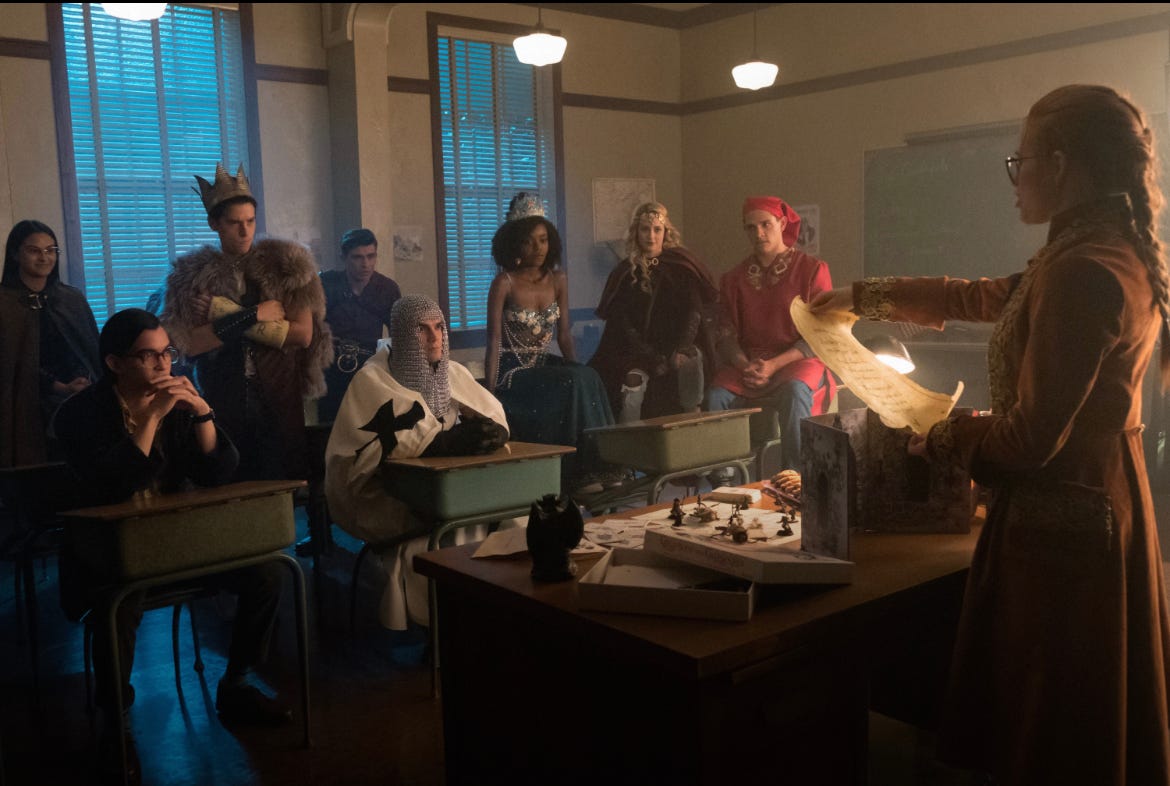
What most fascinates and troubles me about this season is its core obsession with cults. Most obvious, of course, is the main plotline revolving around The Farm, the pseudo-religious commune and social movement that essentially takes the town of Riverdale over during the course of the season. But we also see this theme in the all encompassing, all possessing games of Gryphons & Gargoyles that manifest in complex rituals, practices, deity-like figures, and belief sets which control many characters' lives, and which also results in a huge number of deaths, that call to mind the infamous and sensationalised stories of murder suicides that we associate with real life cults. The brainwashing tactics of The Farm are paralleled by the controlling force of Riverdale’s various drug trades, including the trade of consciousness altering fizzle rocks which infiltrates Veronica’s speakeasy, or the use of G which causes its users to become violent and zombie-like. In juvenile detention, Archie becomes embroiled in an underground fight ring which operates with esoteric, cult-like principles of ritual performance, rites of initiation, and secrecy.
With these connections in mind, what do we mean when we call something a cult? In academic circles, the term has fallen very much out of fashion for its derogatory implications and usage - as scholar Megan Goodwin notes, the term cult is often used as “shorthand for ‘religion I don’t like’.”1 Instead, scholars today often use the term New Religious Movement(often abbreviated as NRM) to refer to these religious or spiritual which fall outside of or deviate from traditional, established religion. Alternative spiritualities and new religions are incredibly varied, and in spite of common misconceptions surrounding cults, there is nothing inherently bad, dangerous, or harmful about them. Culturally, however, these perceptions are hard to shake, and the moral panics around brainwashing, satanic influence, and the association of cults with acts of murder and violence remain centre stage in the popular imagination of what a cult is.
In the world of Riverdale, this is very much the case, and this season is deeply rooted in the ideas and imagery of cults and the anti-cult movements of the 1970s and 1980s. Moral panics of the period are reflected in The Farm’s insidious spread and the coercive tactics and hypnotism used on members, while the organ harvesting reveal near the end of the season plays out fears and conspiracy theories surrounding the harmful influence and hidden abuse of cult groups. Gryphons & Gargoyles, as a fantasy role playing game that blends into the real world in dangerous ways recalls satanic panic fears and the real world religious backlash against Dungeons & Dragons in the early 1980s. The cults at the centre of Riverdale’s storylines this season enact these fears and hysterias and follow contemporary logic, with interesting twists. While G&G is discovered to be a game with catastrophic repercussions in the lives of Riverdale’s characters, and its controlling forces prove to be fatal to many players, the origins of this seemingly satanic conspiracy are actually traced back to the nuns of the Sisters of Quiet Mercy, who devised the game, its ritualistic systems of play, and the terrifying, powerful figure of the Gargoyle King specifically in order to exert control over the convent’s residents. Just as in previous seasons of Riverdale, religious institutions and belief are forces of violence used to perpetuate and justify harm.
These speak to the fears of brainwashing articulated by anti-cult activism - the way that religions could use coercion, manipulation, and force to control the behaviours and even thoughts of members. One of the most well known figures in the study of brainwashing was Dr. Margaret Singer, whose study of alleged mind-control techniques on prisoners of war, and interviews with cult members led her to develop theories of brainwashing. As Singer claimed in a 1982 New York Times article entitled The Psychology of the Cult Experience, ''Consciously and manipulatively, cult leaders and their trainers exert a systematic social influence that can produce great behavioral changes.'' This understanding of cult brainwashing techniques is exemplified in Riverdale by both G&G players and by members of The Farm. In the same article, another researcher, Dr. Stanley H. Cath “defined a cult as a group of people joined together by a common ideological system fostered by a charismatic leader, where, he said, ‘'the expectation is that they can transcend the imperfections and finitude of life.'... 'Often they set up a we-they philosophy: We have the truth and you do not.'”2 The Farm fits perfectly into this definition of a cult, which I feel is pretty representative of how cults are defined throughout this period of research into their influence. Their ideological system is left pretty vague by the show, although we learn that one of the group’s mantras, “may the one become many, and the many one.” As far as mantras go, it's pretty generic, but it gives the atmosphere of an actual worldview, which is about the most we can expect from Riverdale. The quintessential charismatic cult leader is found in the figure of Edgar Evernever, and The Farm’s ideals of transcendence are made literal when they plan to ascend at the end of the season. The Farm also has a clear dichotomy between in-group and out-group, with complex processes of induction and membership including interview processes that recall the induction techniques and auditing processes of Scientology, and a baptism that is not dissimilar to a Christian baptismal rite. There are clear distinctions in the communications and relations between those inside and outside the group - again, the language of Scientology is echoed in the use of a term “detractor“, which several members use to describe non-Farm friends or family members who they disagree with. As Amanda Montell points out in the book Cultish, the use of language plays an important role in the operation of ‘cult’ communities: “techniques like us-versus-them labels, loaded language, and thought-terminating clichés are absolutely crucial in getting people from open, community-minded folks to victims of cultish violence.”3 So while there is no clear definition of a ‘cult’, The Farm is certainly paradigmatic of the cult craze, a perfect representation of all of the fears and controversies that new religious groups stoked during an era of infamy.
But I think part of what bothers me about The Farm is that we don’t really get to learn much about it. What do members do as part of The Farm? What draws people into this community? What do they believe in? There is a sort of hodgepodge of aesthetic signifiers of new religious movements that identify The Farm. Their members are often seen wearing flowy clothes and all white outfits. Its name and some of what we hear about it suggests a sort of new age-y commune, an aspect which suggests similarity to groups such as Rajneeshpuram or The Family. The most concrete commune thing we get is from a throwaway joke given to Farm joinee Cheryl Blossom: “Do you think these Louboutins are too flashy for kombucha brewing?” At the end of the season, we see the visuals of cultishness take on more sinister tones, including in the scene where it is revealed that Kevin has been Left Behind and is surrounded by piles of matching clothes and shoes, suggestive both of a Christian rapture, and of the exit of member’s of Heaven’s Gate. If we jump ahead to the beginning of season 4, we see that their ascension has led the group to a new compound, where Edgar becomes increasingly controlling, erratic, and violent, continuing to make claims that the group will ascend, and warning of persecution from outside forces, themes which also may have been inspired by the messaging of Heaven’s Gate, but also more clearly recalling Jim Jones, the leader of the Peoples Temple, or the Branch Davidians, three examples of new religious movements whose fear of persecution and outside dangers to their small, insular communities lead to massive acts of violence. While none of these real world groups, except for the Branch Davidians(FBI agent Charles Smith warns Betty that she cannot risk a raid on The Farm's compound by referencing ‘Waco’), are directly named by the show, their legacies can be felt throughout this storyline and it is clear that much of The Farm’s language and aesthetics were inspired by these real world cases, yet there is no clear picture of what The Farm is beyond what it references.
In terms of beliefs, Edgar teaches his disciples to embrace spiritual cultivation, using planting seeds and letting them grow as a metaphor for the individual and communal development that The Farm is designed to promote. This is something I wish we could have learned more about, as its clearly intended to be the central premise and promise of the group, which might anchor much of their belief system. In practice, we mostly see him taking on a role that is somewhere between therapist, confessor, and auditor, where he listens to the confessions and problems of his followers, encouraging them to divulge secret or personal information, all of which is recorded. He also seemingly uses forms of hypnotism and manipulative tactics based on the vulnerable information he learns in order to control members of The Farm. He gets loyalty from Cheryl, for instance, by helping her to talk about and heal some of her grief from the loss of her brother, all while convincing her that she can ‘talk’ to Jason again - the reality is that they have exhumed his grave and Cheryl has been talking to a dead body. Edgar manipulates Alice by similarly convincing her he can help her contact her son Charles, while also recording her confessions of criminal activity which could be used as evidence against her if she were to defect. The control Edgar exerts is total -psychological, social, financial - and it proves to be a very powerful force in the ultimately dark aims of The Farm.
The one thing that is represented most clearly in the show about this community’s practices comes in the form of the twist discovery that The Farm has been harvesting organs from its members. One of Edgar’s therapeutic techniques is an act not dissimilar to psychic surgery, a pseudoscientific practice whereby injuries or illnesses are alleged to be physically cured by psychic means, where he is believed to be able to concentrate all of a person’s psychological problems, past traumas, and mental wounds into physical form in their body, a form which is then physically, surgically removed, allowing the individual to move on with their life unburdened by their past. In actuality, the physical burdens he is removing are things like kidneys. It is suggested that he may be doing this for the benefit of his wife Evelyn, who has also maintained a position of leadership in The Farm and particularly in its recruitment throughout the season, and who is revealed to be ill and undergoing dialysis, possibly awaiting an organ transplant from an unwitting donor. Betty discovers that The Farm’s organ harvesting operation is even more extensive than that, and encompasses selling the organs as well.
This reveal is The Farm at its most conspiracy theory fueled, urban legend come true, evil cult level of cultiness. It is the most extreme and unbelievable practice they have, and it's also probably the one that we see the most clearly in the show. Once again, we are shown only the aspects of a new religious movement that invoke danger and terror, a cult without any clear sense of ideology or belief, but which seems only to revolve around the pop cultural, moral panic fears and horror ideals of ‘Cults’.
We only ever learn about The Farm from an outgroup perspective, and primarily through the eyes of Betty, who is mistrustful and critical of the group from the start, very much taking on the anti-cult position in this story. We don’t need to know about the belief system of The Farm, or what Farmies do and believe, because it doesn’t matter. They’re in the Cult, and the Cult is Bad. Instead of articulating why so many people are drawn to Edgar Evernever and his community, we simply are told that they’re being brainwashed and manipulated, and rather than genuinely considering the social factors that would keep people in The Farm, or the high exit costs and risks that defectors might face, characters are treated as illogical and selfish when they are unwilling to leave the community. This perspective makes sense for the kind of genre inspired, homage filled story they’ve decided to tell here, but it’s also one that feels reductive and lacking in empathy. This is frustrating not only because it makes for a cheap representation of religious experience and a shallow portrayal of the dynamics of tight knit, insular communities, and further because I think it misses out on a lot of potential for interesting television - what if the story had taken us inside The Farm and shown the insidious ways that people are drawn in to a community, but soon find themselves in escalating situations, and to learn that it is easy to enter a promised better world, but far harder to escape? This level of experience would have made the Farm feel far more real, and provided opportunity to explore what I think truly makes a group like this frightening - that it could happen to anyone, that none of us are immune to the call of transcendence.
Ultimately, I don’t think Riverdale is saying, or trying to say, or even should say, anything profound about religiosity through its representations of new religious movements. However, it is fascinating to explore the different ways that specific themes of religious belief, anti-cult activism, and more are expressed through the storylines of The Farm, the Gargoyle King, and G&G, and how Riverdale’s fascination with the aesthetics and tropes of 70s and 80s genre pop culture inspires its fantastic and fearful depictions of powerful entities, controlling groups, and cult-like dangers throughout the show’s third season.
Notes and Corrections: Season 3
A few notes on things I wanted to mention about the season 3 story but forgot to include in my previous write up of the season:
In my previous recap, I said Archie was ‘found guilty’ and then sent to juvenile detention, but his trial actually ended in a mistrial when the jury couldn’t come to a decision. He makes a rash decision to take a plea deal, receiving jail time only after pleading guilty to a crime he was being framed for.
After Sheriff Keller was fired back in season 2, the Lodges installed corrupt Sheriff Minetta to be Riverdale’s new law enforcement. He kills several witnesses related to Archie’s trial, then goes missing and is believed dead, then implicated in an assassination attempt against Hiram Lodge, then gets murdered for real.
It is revealed that Clifford Blossom did not commit suicide at the end of season 1, but was actually poisoned by Penelope Blossom, who also poisons identical twin brother Claudius Blossom this season, among others.
The Riverdale High prom is medieval themed and everyone actually attempts to dress to the theme. I don’t think that this has ever happened at a real high school prom.
The Gargoyle King threatens Jughead’s sister, Jellybean, forcing the Jones family to complete various quests, including one where they rob Pop’s diner, and FP Jones is shot during the attempt.
Tom Keller and Sierra McCoy get engaged, and their kids, Kevin and Josie, try to plan an engagement party for them(Kevin: “if there is no wedding reception, it means the gargoyle king has won.”) When Josie decides to leave Riverdale to pursue her career in music, she and Sierra leave the show and this is never mentioned again?
Another amendment: in my previous recap, I said that Betty “escaped” from Edgar after he plans to lobotomize her, but in actuality, she was ‘purchased’ by Penelope Blossom, who turned out to be a customer of The Farm’s black market organ business.
Last and most importantly, I completely failed to mention the introduction of the Bunker! While investigating G&G, Betty and Jughead learn that Dilton Doiley, Ben Button, and Ethel Muggs have been playing the game in a secret underground bunker in the woods, which becomes an important location for mystery investigations, hanging out, laying low, hooking up, keeping hostages, etc. It’s really an all purpose secret underground bunker in the woods, and it becomes one of the most important locations in the show.
Iconic Moments in Riverdale History:
Flying babies!!
Betty’s hallucination of the twins(Dagwood and Juniper) being thrown into a bonfire, but instead of burning, the babies magically levitate. This is honestly hilarious, also interesting as one of the first and most quintessential examples of this season’s satanic panic imagery.
Cheryl Blossom: “Did you have a lobotomy for breakfast?”
This line delivery deserves an Emmy. A Tony. A Nobel peace prize. Literally invented the colour red.
The Heathers the Musical episode in its entirety is incredible. They have all rehearsals in full costume. Toni tries to hook up with two random classmates in the auditorium during the school day. They add exaggerated whip sound effects to the musical performances for no reason. There are occult rituals with members dressed in all white and singing pop musical songs. Jughead destroys his childhood home. Edgar Evernever leads the audience in a creepy slow clap at the end of the opening night performance.
Mysterious mass seizure?
Archie’s famous encounter with a grizzly bear, and then his later fight with a guy dressed as a bear who Penelope hired to try to kill him.
The introduction of the serial killer genes!!!!
Betty is alleged to be a carrier of a gene sequence that supposedly makes people more prone to violent and sociopathic behaviour
Alice claims they found out that they learned Betty had the genes when Betty had to go to the doctor for a concussion as a child. Why were they doing genetic testing on her for a concussion?
It’s also worth noting that the context of this admission makes it highly suspect, as it happens during an arc where Alice, Polly, and Edgar are actively lying to Betty to try to coerce her into joining their commune.
I cannot leave this exchange off the list:
“I dropped out in the fourth grade to run drugs for my Nana”
“Then you haven’t known the triumphs and defeats, the epic highs and lows of high school football.”
Foreshadowing:
Veronica refers to herself as Hiram’s ‘only daughter’. In season 4, we’ll meet a new member of the Lodge family.
“Bad things happen but you can’t get rid of your past” is a takeaway that may be counteracted in season 7.
The mysterious disappearance of the Farm at the end is a major plotline in the early part of season 4
The season finale includes the introduction of Charles Smith, a major character in season 4 and beyond
This season has the first, but definitely not the last mention of the ‘serial killer genes’
The flash forward to spring break at the very end of the season sets up the main mystery of season 4!
Jughead’s ominous pronouncement of Riverdale’s past, present, and future: “It’s a vicious cycle of never ending madness that turns back on itself, over and over again, until someone breaks the chain.”
Season Rankings(so Far):
Season three
Season one
Season two
I absolutely love season 3, it is undoubtedly one of the best seasons of this show.
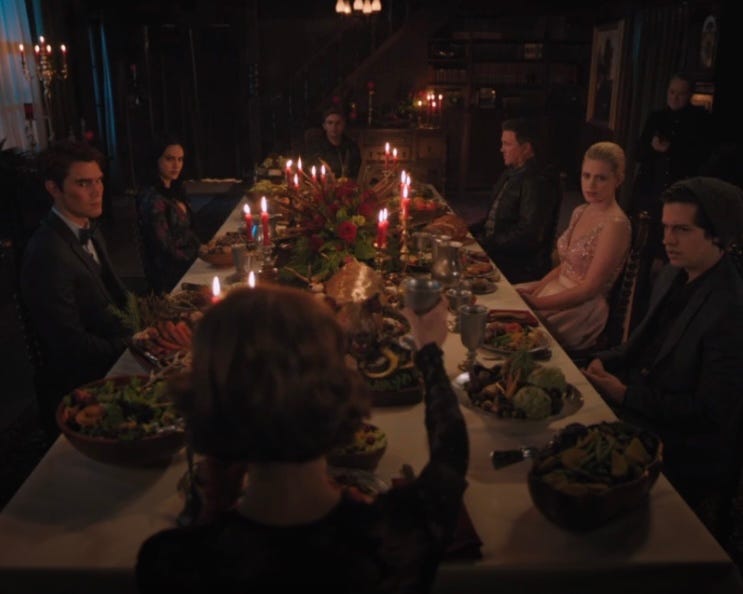
p.s. happy belated birthday to Jughead(October 2!)
“Turkey Ritual”, Study Religion podcast from the Dept. of Religious Studies at UA. Episode transcript here: https://religion.ua.edu/wp-content/uploads/2017/08/Ep_-2-Turkey-Ritual.pdf
Collins, Glenn, “The Psychology of the Cult Experience,” The New York Times, March 15, 1982. https://www.nytimes.com/1982/03/15/style/the-psychology-of-the-cult-experience.html
Montell, Amanda, Cultish: The Language of Fanatacism, 2021, 94.





